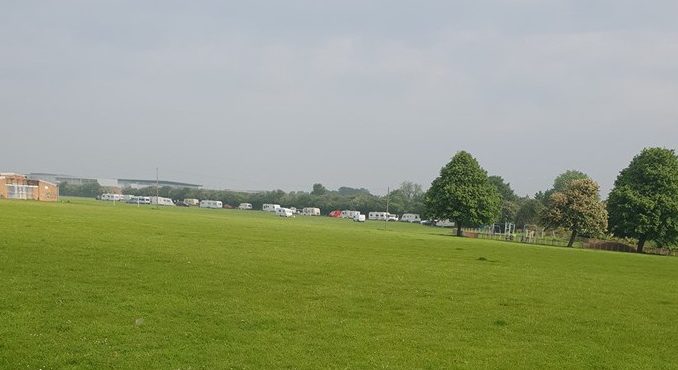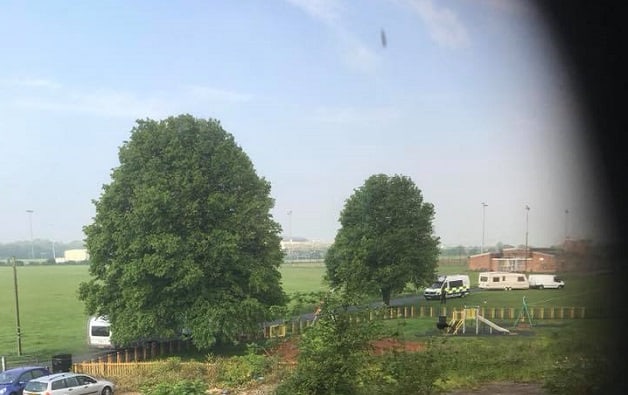
A Travellers’ group at Jackey Bakers playing fields in Ramsgate has been issued notice to leave.
Thanet council served the Section 77 notice after carrying out welfare checks yesterday (May 30).
The group, consisting of around 16 vans, set up on the fields on May 26 after being served a county court Order of Removal to leave the car park by Dreamland the day before.
It is an offence for somebody subject to such a notice to fail to leave as soon as reasonably practicable or to re-enter the site within three months of the date on which the notice was given.
If the Travellers do not comply with the Section 77 Notice, Thanet council will need to apply to the court for an Order of Removal.

The eviction notice will cost some £226. If further hearings are necessary, this can go up to £355 each time.
Further settlements this year have taken place at St Nicholas, Manston Tesco and land by the Manston airport site.
Jackey Bakers was used by two separate groups last June and there was a large encampment at the site in July 2016.
The process
Council land
For council-owned land Thanet council would need to obtain a ‘direction to leave’ order from magistrates’ court.
To do this the authority has to:
- Show that the gypsies/travellers are on the land without consent.
- Have regard to the general health and welfare of the group and the children’s education.
- Ensure that the Human Rights Act 1998 has been fully complied with.
The council must follow a set procedure that is based on Government guidance. This procedure includes proving ownership of the land, carrying out assessments for the health, welfare and education criteria, and assessing the impact of the encampment on its location and local neighbourhood.
Once these have been carried out the council can use this information for the service of notices and summonses to apply for a court order for eviction.
Private land
For privately-owned land the landowner can attempt to agree a leaving date with the travellers or take proceedings in the County Court under the Civil Procedures Rules 1998 to obtain a court order for their eviction as trespassers.
The landowner may be in breach of planning legislation and the Caravan Sites Act 1960 unless they have already obtained planning permission for a caravan site.
If there is no planning permission the council may take proceedings against the landowner to require removal of the illegally parked caravans.
Providing Traveller sites – the law
The Housing Act 2004 and Planning Circular 01/2006, Planning for Gypsy and Traveller Caravan Sites, has put in place a framework which means every local authority has to identify land for the sites that are needed in its area. The Secretary of State has powers that can ensure that those sites are identified, and the Local Government Association (LGA) says local authorities should be proactive in doing so.
The LGA adds: “The provision of these sites removes a major cause of friction between the two communities – unauthorised sites and illegal camping.”
The nearest authorised sites to Thanet are at Aylesham and Canterbury.
The Gypsy and Traveller communities
According to a report by the LGA there are around 16,000 Gypsy and Traveller caravans in England. Around three quarters of these caravans are on authorised sites.
Many of these sites are well-managed and are an accepted part of the local community. In 1994 the duty on local authorities to provide sites was removed and since then under-provision of authorised sites has resulted in Gypsies and Travellers camping on land that they do not own (unauthorised encampments) or developing their own land without planning permission (unauthorised developments).
While the number of caravans on unauthorised encampments has started to decline, the number of caravans on unauthorised developments has increased. The average size of an unauthorised development is around 4 caravans, and private sites with planning permission have an average of 6 caravans.

